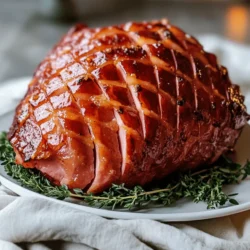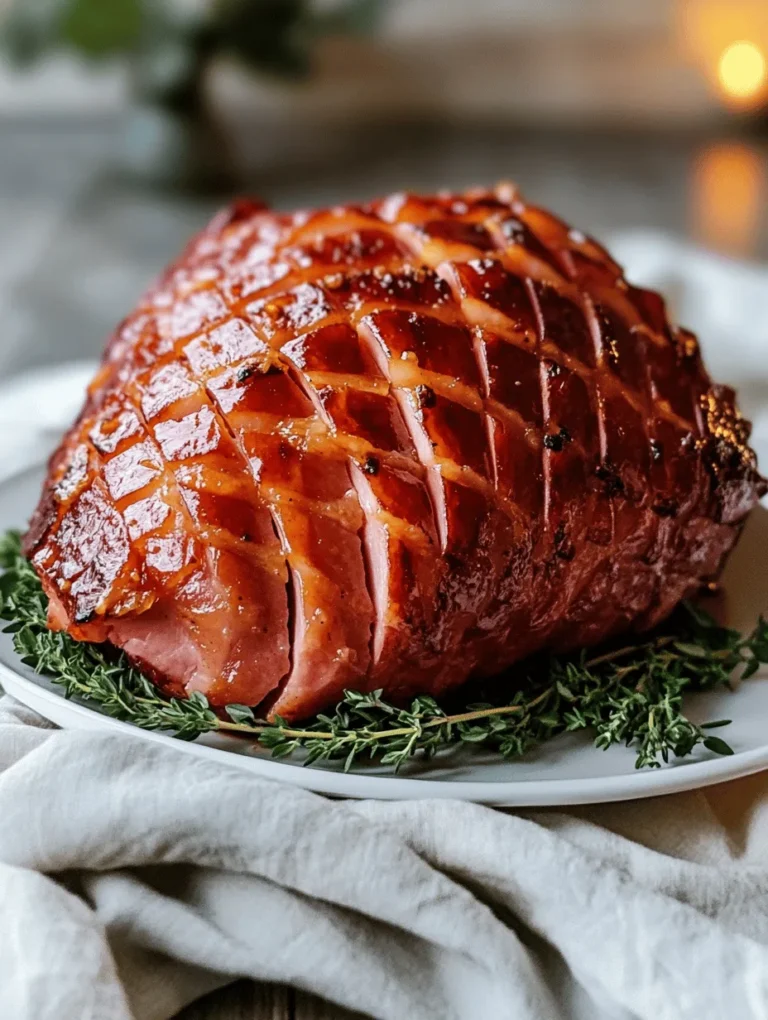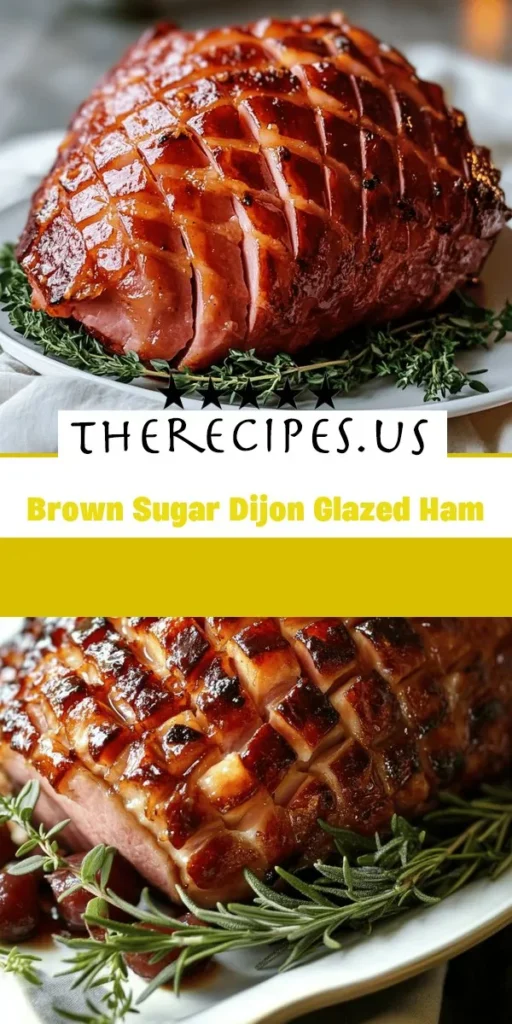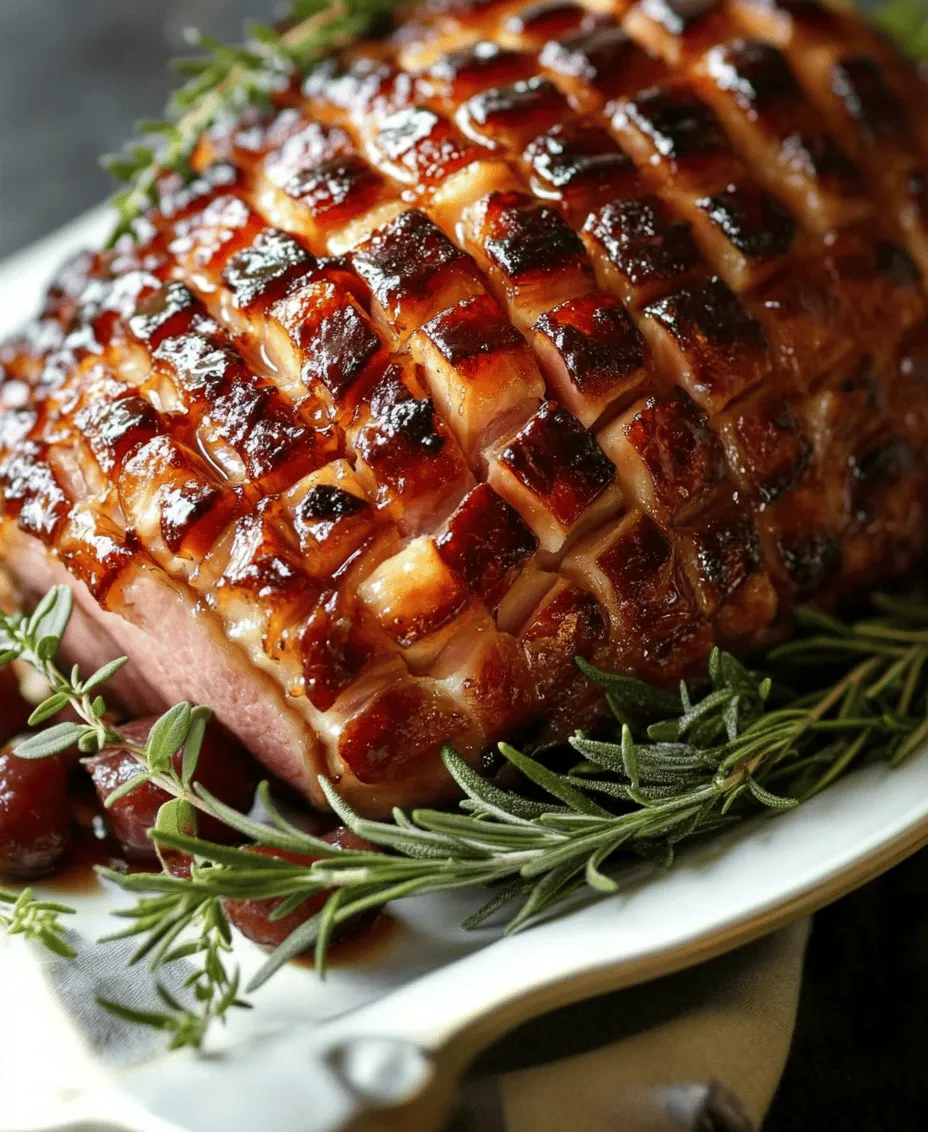Introduction
When it comes to holiday feasts and festive gatherings, few dishes evoke the warmth and nostalgia of a beautifully glazed ham. The Sweet and Savory Brown Sugar Dijon Glazed Ham stands out not just as a centerpiece but as a delightful fusion of flavors that captivate the senses. This dish marries the sweetness of brown sugar with the tangy notes of Dijon mustard, creating a glaze that caramelizes beautifully in the oven, resulting in a ham that is not only visually stunning but also bursting with flavor.
This glazed ham is more than just a meal; it symbolizes celebration and togetherness, often gracing tables during special occasions such as Easter, Thanksgiving, and Christmas. Its rich flavor profile and impressive presentation make it a beloved choice for both casual family dinners and grand holiday banquets. The combination of sweet and savory elements in this recipe ensures that it appeals to a wide range of palates, making it a crowd-pleaser that will leave your guests asking for seconds.
Understanding the Ingredients
Fully Cooked Bone-In Ham
The star of our recipe is the fully cooked bone-in ham, which serves as the foundation for the glaze and the dish as a whole. When selecting your ham, quality is paramount. A bone-in ham not only offers superior flavor but also retains moisture during the cooking process. Look for a ham that has been cured and smoked, as these elements will enhance the overall taste and texture.
Choosing the right size is also crucial; a general rule of thumb is to allocate about half a pound of ham per person for a bone-in variety. This ensures that there will be plenty of delicious leftovers to enjoy in the days following your celebration.
The Glaze Ingredients
The glaze is where the magic happens, transforming the humble ham into an extraordinary dish. Let’s break down the key ingredients that bring this glaze to life:
Brown Sugar
Brown sugar is the backbone of our glaze, providing sweetness and depth. When heated, brown sugar melts and caramelizes, creating a sticky, flavorful coating that clings beautifully to the ham. Its molasses content contributes not only to the sweetness but also to a rich, complex flavor that enhances the overall dish.
Dijon Mustard
Dijon mustard introduces a tangy element that cuts through the sweetness of the brown sugar, creating a balanced flavor profile. Its sharpness elevates the glaze, adding sophistication and depth. The mustard acts as a binding agent in the glaze, helping it adhere to the surface of the ham while contributing to its overall taste.
Apple Cider Vinegar
To further balance the sweetness, we include apple cider vinegar. This ingredient adds acidity, which brightens the flavors and enhances the overall taste of the glaze. The tanginess from the vinegar works in harmony with the Dijon mustard, ensuring that the glaze is not overly sweet.
Honey
While brown sugar provides a primary source of sweetness, honey adds another layer of complexity. Its floral notes complement the other ingredients, enhancing the glaze’s depth and richness. Honey also contributes to the glaze’s glossy finish after cooking, making the ham visually appealing.
Spices: Ground Cinnamon, Cloves, Black Pepper, and Salt
A blend of spices elevates the glaze, providing warmth and aromatic depth. Ground cinnamon and cloves introduce a festive essence that pairs beautifully with the ham. Black pepper adds a hint of heat, while salt enhances the overall flavor profile, ensuring that each bite is well-seasoned.
Fresh Parsley
Finally, fresh parsley is used as a garnish, adding a pop of color and freshness to the finished dish. Not only does it enhance the visual appeal, but its bright flavor also complements the rich glaze, providing a refreshing contrast.
Preparation Steps for the Perfect Glazed Ham
Preheating the Oven
Before diving into the preparation of the ham, it’s essential to preheat your oven to 325°F (165°C). This temperature is ideal for warming the ham through while allowing the glaze to caramelize without burning. A properly preheated oven ensures that the ham cooks evenly and retains its moisture, resulting in a tender and juicy dish.
Preparing the Ham
Once the oven is preheated, it’s time to prepare the ham. Begin by removing the ham from its packaging and placing it on a sturdy cutting board. If your ham comes with a plastic disk on the bone, be sure to remove it, as it is not meant to be cooked.
Scoring the Ham
A vital step in preparing the ham is scoring the surface. Using a sharp knife, create shallow cuts in a diamond pattern across the surface of the ham. This technique serves multiple purposes:
1. Enhanced Glaze Penetration: Scoring allows the glaze to seep into the ham, infusing it with flavor and moisture.
2. Better Caramelization: The cuts expose more surface area to the heat, promoting caramelization of the sugars in the glaze and creating a beautiful, crispy exterior.
3. Visual Appeal: The diamond pattern adds an attractive aesthetic to the finished dish, making it more appealing when served.
Making the Glaze
Now that the ham is prepared, it’s time to create the glaze. In a medium saucepan, combine the brown sugar, Dijon mustard, apple cider vinegar, honey, and spices.
1. Combine Ingredients: Start by adding the brown sugar to the saucepan, followed by the Dijon mustard. The mustard will help to bind the sugar, creating a thick paste.
2. Add Liquid Ingredients: Pour in the apple cider vinegar and honey. These ingredients will help to dissolve the sugar and create a smooth glaze.
3. Mix Well: Whisk the mixture over medium heat until the sugar is fully dissolved and the glaze is smooth. This process should take about 3-5 minutes.
4. Achieving the Perfect Consistency: If the glaze feels too thick, you can add a splash of water to thin it out. Conversely, if it’s too thin, allow it to simmer for a few additional minutes until it reaches your desired consistency. The ideal glaze should be thick enough to adhere to the ham without being overly runny.
Once the glaze is ready, remove it from the heat and set it aside to cool slightly. This will help it thicken further and make it easier to apply to the ham.
With the oven preheated and the glaze prepared, you’re now ready to assemble and bake your Sweet and Savory Brown Sugar Dijon Glazed Ham. Stay tuned for the next steps where we will cover the glazing process and the cooking times to achieve the perfect ham.
Cooking Process: Roasting the Ham
Roasting a ham, especially one glazed with a sweet and savory brown sugar Dijon mixture, is a delightful endeavor that fills your kitchen with an irresistible aroma. Here’s how to perfectly roast your ham, ensuring each bite is bursting with flavor.
Step-by-Step Guide to Glazing and Roasting the Ham
1. Preheat the Oven: Begin by preheating your oven to 325°F (163°C). A consistent oven temperature is essential for even cooking.
2. Prepare the Ham: Place your ham in a roasting pan, fat side up. If you have a pre-cooked ham, there’s no need to cook it for too long—just enough to heat it through and allow the glaze to infuse.
3. Initial Glazing: Brush a generous layer of the brown sugar Dijon glaze over the surface of the ham. Make sure to get into any crevices for maximum flavor.
4. Cover with Foil: Cover the ham loosely with aluminum foil to prevent excessive browning and drying out. This step is crucial during the first half of the roasting process.
5. Roasting Time: Place the ham in the preheated oven. The general rule of thumb is to roast the ham for about 15 minutes per pound. For a 10-pound ham, this translates to approximately 2.5 hours.
Importance of Covering the Ham with Foil Initially
Covering the ham with foil during the initial roasting phase helps retain moisture. This prevents the outer layer from becoming overly dry while the interior heats up and absorbs the glaze. By the time you remove the foil, the ham will be tender and juicy, setting the stage for a beautifully caramelized exterior.
How to Monitor the Internal Temperature
To ensure your ham is cooked to perfection, it’s crucial to monitor the internal temperature. The USDA recommends that the internal temperature of a fully cooked ham should reach 140°F (60°C) and for fresh ham, it should reach 145°F (63°C). Use a meat thermometer inserted into the thickest part of the ham, avoiding the bone for an accurate reading.
Applying Additional Glaze for a Caramelized Finish
Once the ham reaches about 130°F (54°C), remove the foil and brush on an additional layer of the brown sugar Dijon glaze. This step is essential for achieving that desirable caramelized finish. The sugars in the glaze will create a beautiful crust as the ham continues to roast.
Timing and Frequency of Glazing During the Final Phase of Cooking
For a truly decadent finish, glaze the ham every 20-30 minutes during the final hour of roasting. This allows the glaze to thicken and caramelize without burning. Keep a close eye on the ham during this period, as the sugars can burn quickly if left unattended.
Resting and Serving the Ham
Once your ham is beautifully roasted and glistening with glaze, it’s time to let it rest before serving. This step is crucial for maintaining juiciness and enhancing the overall flavor.
Importance of Resting the Ham Post-Cooking
Resting allows the juices to redistribute throughout the meat, resulting in a more flavorful and tender ham. If you slice into the ham immediately, the juices will run out, leaving you with a dry dish.
How Resting Affects Juiciness and Flavor
Let the ham rest for about 20-30 minutes after removing it from the oven. During this time, cover it loosely with foil to keep it warm. The waiting period will ensure every slice retains its moisture and flavor.
Slicing and Arranging the Ham for Presentation
When it’s time to slice the ham, use a sharp carving knife for clean cuts. Start by removing the skin if it hasn’t been taken off already, then slice down to the bone along the natural seams of the meat. Aim for even slices, about ½ inch thick, which are perfect for serving.
Tips on Achieving Even Slices
To achieve even slices, consider using a carving fork to stabilize the ham while slicing. A meat slicer can also be a great tool if you prefer uniformity. It is advisable to slice the ham against the grain, as this makes the meat more tender and easier to chew.
Drizzling Remaining Glaze and Garnishing for Visual Appeal
Once sliced, arrange the ham on a serving platter. Drizzle any remaining glaze over the top and garnish with fresh herbs like parsley or rosemary for an added touch of color and freshness. This not only enhances the visual appeal but also adds a delightful aroma.
Pairing Suggestions for a Complete Meal
Now that your Sweet and Savory Brown Sugar Dijon Glazed Ham is ready to serve, consider which sides and beverages will complement its rich flavors.
Recommended Side Dishes that Complement the Ham
1. Classic Mashed Potatoes: Creamy and buttery mashed potatoes are a staple side that pairs beautifully with ham. Consider adding roasted garlic or fresh herbs for extra flavor.
2. Green Beans Almondine: Lightly sautéed green beans with toasted almonds provide a fresh, crunchy contrast to the sweetness of the ham.
3. Roasted Brussels Sprouts: The slight bitterness of roasted Brussels sprouts balances the glaze’s sweetness, making them an excellent choice.
4. Macaroni and Cheese: A comforting, cheesy dish that’s always a hit at gatherings, adding a touch of indulgence to your meal.
5. Cranberry Sauce: The tartness of cranberry sauce cuts through the sweetness of the glaze, offering a refreshing palate cleanser.
Beverage Pairings that Enhance the Flavors of the Ham
When it comes to beverages, consider these pairings:
– White Wine: A dry Riesling or Chardonnay pairs beautifully with the sweet and savory elements of the ham.
– Sparkling Cider: For a non-alcoholic option, sparkling cider offers a refreshing contrast.
– Herbal Iced Tea: Light and refreshing, herbal iced tea can be a wonderful complement to the rich flavors of the dish.
Nutritional Information
Understanding the nutritional profile of your Sweet and Savory Brown Sugar Dijon Glazed Ham can help you make informed choices for your meal planning.
Overview of Serving Size and Nutritional Aspects
A typical serving size of glazed ham is around 3 ounces. Here’s a general breakdown of the nutritional content for this serving size:
– Calories: Approximately 150-200 calories
– Protein: 15-20 grams
– Fat: 7-10 grams
– Carbohydrates: 5-10 grams (mostly from the glaze)
– Sodium: Varies widely depending on the ham type
Potential Health Considerations of the Ingredients Used
While ham can be a delicious protein source, it’s essential to consider the sodium content, especially for those monitoring their sodium intake. The brown sugar glaze adds sweetness and flavor but also contributes additional sugars, so moderation is key.
Conclusion
The Sweet and Savory Brown Sugar Dijon Glazed Ham is not just a meal; it’s a centerpiece that brings people together during festive gatherings and special occasions. With its perfect blend of sweet and savory flavors, this dish is sure to impress your family and friends.
We encourage you to try this recipe for your next family gathering, holiday feast, or simply as a treat for yourself. The joy of cooking and sharing delicious meals is what brings us together, and this ham will undoubtedly create lasting memories around your dining table. Enjoy the process, savor the flavors, and relish in the smiles you create with every bite.



